Course components (in gory detail)
 Participation:
There is an old saying that "It's
better to be thought a fool than to
open your mouth and remove all doubt."
While this attitude is quite pervasive
among students, it usually constitutes
an impediment to learning in the
classroom.
Class participation is very
important not only for your own success but also for that of your
classmates. So try to become active participants in the learning
community, whether it be the actual
classroom or in the discussion board. Form study
groups, participate in classroom discussions, and be prepared to answer
questions when called upon in class. Of course,
feel free to ask questions at any time. While
attendance is not mandatory, except in
labs and during student presentations, excessive absences
can lower you
participation grade and will also leave a bad
impression.
Participation:
There is an old saying that "It's
better to be thought a fool than to
open your mouth and remove all doubt."
While this attitude is quite pervasive
among students, it usually constitutes
an impediment to learning in the
classroom.
Class participation is very
important not only for your own success but also for that of your
classmates. So try to become active participants in the learning
community, whether it be the actual
classroom or in the discussion board. Form study
groups, participate in classroom discussions, and be prepared to answer
questions when called upon in class. Of course,
feel free to ask questions at any time. While
attendance is not mandatory, except in
labs and during student presentations, excessive absences
can lower you
participation grade and will also leave a bad
impression.
- Don't be a vegetable.
- It's not uncool to ask or answer
questions in class.
- The only wrong answer is no answer
("Hmm, I dunnnoooo...").
- Please make suggestions for class
improvement.


Homework: To
help you keep up with class material, weekly graded (required) assignments have been set up at
at
http://webassign.net.
Expect about 20 problems per week to 10
days, which will translate to about 2-3
problems per day (with proper time
management). For
best results, you should first work on the
problems by yourself with as few resources
as possible, as if you were taking a test.
That means no notes, no books, no tutor.
Remember that frustration and some trial
and error are essential parts of the
learning process. Merely getting the right
answer with the help of the book or a
tutor may bypass the critical learning
component. Students who rely too much on
outside help often develop a false sense of
security and experience a collapse on the
exams. Of course, you should get help
after making a sincere effort and hitting
a dead end. However, even after getting
help, make sure to reproduce the solution
under test-like conditions.
- Start working on the homework as
soon as it becomes available.
- There are no legitimate
excuses for late homework.
- Getting the right answer is not the
same as understanding the problem.

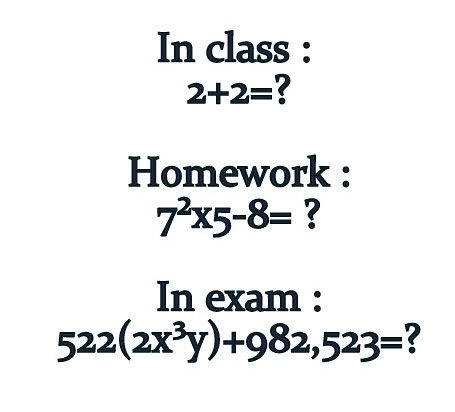 Exams: This is your chance to show off what you
have learned. Much of the material on the exams is taken almost directly
from the homework. So if you do your homework
and stay alert in class, you should have no trouble. The final tends to be
a bit more challenging than the midterms,
particularly for those students who tend
to cram and memorize. On the other hand,
the final can also be your opportunity to make up for any
weaknesses that may have existed up to
that point. Because of the wide spectrum
of preparedness on the part of the
students, the distribution of scores on
the exams can also be quite broad. An
average of 50-60% is not unusual, with
some students significantly above and
some below. If you need special
accommodations, please let me know in advance.
Exams: This is your chance to show off what you
have learned. Much of the material on the exams is taken almost directly
from the homework. So if you do your homework
and stay alert in class, you should have no trouble. The final tends to be
a bit more challenging than the midterms,
particularly for those students who tend
to cram and memorize. On the other hand,
the final can also be your opportunity to make up for any
weaknesses that may have existed up to
that point. Because of the wide spectrum
of preparedness on the part of the
students, the distribution of scores on
the exams can also be quite broad. An
average of 50-60% is not unusual, with
some students significantly above and
some below. If you need special
accommodations, please let me know in advance.
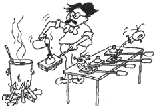 Lab: This is the place where you get a chance to
participate in some "hands-on" activities,
designed not only to make the subject
matter less abstract but are hopefully
also just plain fun.
Lab: This is the place where you get a chance to
participate in some "hands-on" activities,
designed not only to make the subject
matter less abstract but are hopefully
also just plain fun.
"In the matter of physics, the
first lessons should contain nothing but
what is experimental and interesting to
see. A pretty experiment is in itself
often more valuable than twenty formulae
extracted from our minds."--Albert
Einstein, A. Moszkowski, Conversations
with Einstein, page 67, Horizon Press
(1970)
Students will form groups of about 3-5 people and
will apply the scientific method to the collection
and analysis of data from various experiments
related to class topics. For each lab, each group
will submit a
write-up subject to peer review. We'll try to keep lab as fun and informal as
possible, but attendance and punctuality are mandatory.
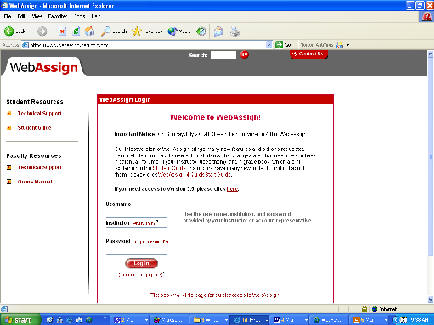
 Webassign
and Canvas:
All assignments in this class are
submitted online either at
www.webassign.net
or in
Canvas (http://Canvas.highline.edu).
Webassign is used
for homework and exams; Canvas is used
for everything else. You
should log in regularly to make sure
that you are aware of all due dates. To
access and submit your assignments, you
need to input your username, password,
and institution name. The institution
name is highline.cc.wa. While webassign
is a powerful instructional tool for
both student and teacher, it is
regrettably not free. Students pay a
per-quarter fee of about $20 online (http://www.webassign.net/info/support/access_codes.html).
Webassign
and Canvas:
All assignments in this class are
submitted online either at
www.webassign.net
or in
Canvas (http://Canvas.highline.edu).
Webassign is used
for homework and exams; Canvas is used
for everything else. You
should log in regularly to make sure
that you are aware of all due dates. To
access and submit your assignments, you
need to input your username, password,
and institution name. The institution
name is highline.cc.wa. While webassign
is a powerful instructional tool for
both student and teacher, it is
regrettably not free. Students pay a
per-quarter fee of about $20 online (http://www.webassign.net/info/support/access_codes.html).
 Group
presentation: This is your opportunity to
research a topic of interest to you (but
related to course material) in some
depth and educate your peers (the
class), while sharpening your
communication skills. They do say, after
all, that the best way to learn a topic
is to teach it. Your presentation should
include a short poster and/or PowerPoint
presentation. You are encouraged to
choose a topic of particular interest to
you. Keep in mind, however, that it is
ultimately your responsibility to find a
topic. You are also encouraged to use
any other props which you feel will
enhance your presentation and stimulate
your audience. For instance, you may
choose to entertain the class with a
demo (related to the class), which is a
simple experiment that demonstrates an
important scientific principle. A degree
in engineering or astrophysics is not
required, but a creative spirit and an
outpouring of enthusiasm wouldn't hurt. You should work
in groups of 3-5 people, but you must
share the workload.
Group
presentation: This is your opportunity to
research a topic of interest to you (but
related to course material) in some
depth and educate your peers (the
class), while sharpening your
communication skills. They do say, after
all, that the best way to learn a topic
is to teach it. Your presentation should
include a short poster and/or PowerPoint
presentation. You are encouraged to
choose a topic of particular interest to
you. Keep in mind, however, that it is
ultimately your responsibility to find a
topic. You are also encouraged to use
any other props which you feel will
enhance your presentation and stimulate
your audience. For instance, you may
choose to entertain the class with a
demo (related to the class), which is a
simple experiment that demonstrates an
important scientific principle. A degree
in engineering or astrophysics is not
required, but a creative spirit and an
outpouring of enthusiasm wouldn't hurt. You should work
in groups of 3-5 people, but you must
share the workload.
- Be creative and enthusiastic.
- Share the workload.
- Learn PowerPoint.

 Journal: A journal is a record of
occurrences, experiences, and reflections
kept on a regular basis--a bit like a
diary. Whether in industry or in an educational
setting, making observations and generally
being more self-reflective are helpful in
identifying areas of strength and weakness
so that appropriate adjustments can be
made and better problem-solving algorithms
can be developed. By directing you to be
more self-reflective, a journal can
increase your effectiveness by helping you
define objectives and set goals, and
monitor progress toward them. Secondarily,
this process would
also allow an outside observer (e.g.,
supervisor or teacher) to offer some
useful feedback. In this class, you will
be expected to keep such a journal and
make regular
entries in Canvas, roughly every
couple of days. Entries
can include things you've learned or are
having trouble with, and any other
school-related experiences that may be
affecting your performance. Here are
some guidelines:
Journal: A journal is a record of
occurrences, experiences, and reflections
kept on a regular basis--a bit like a
diary. Whether in industry or in an educational
setting, making observations and generally
being more self-reflective are helpful in
identifying areas of strength and weakness
so that appropriate adjustments can be
made and better problem-solving algorithms
can be developed. By directing you to be
more self-reflective, a journal can
increase your effectiveness by helping you
define objectives and set goals, and
monitor progress toward them. Secondarily,
this process would
also allow an outside observer (e.g.,
supervisor or teacher) to offer some
useful feedback. In this class, you will
be expected to keep such a journal and
make regular
entries in Canvas, roughly every
couple of days. Entries
can include things you've learned or are
having trouble with, and any other
school-related experiences that may be
affecting your performance. Here are
some guidelines:
-
Your first entry should
be some comment on the
syllabus--basically, to leave the
impression that you've looked it over.
-
Your progress and mastery of the
material should be addressed regularly.
-
You should offer thoughtful critique of
the various sections of the textbook.
-
You should report
on your progress with
procrastination (a serious issue for
most students).
-
A separate
assignment, called 'grade', similar
to the journal, will give you the
opportunity to argue for the grade that you think you
have earned based on the criteria listed
in this syllabus. The grade calculator,
http://people.highline.edu/iglozman/classes/gradecalc.htm,
has a rubric to help you come up
with reasonable numbers.
-
Sample journal
entry: "I have been so excited
about taking this class, but I'm so
frustrated this week because I've
been sick with such a bad cold that
it's been hard to think and do much
of anything. I don't feel like I've
gotten as involved in the class yet
as I would like to be. I did most of
the first homework and really
enjoyed it. It was kind of like a
learning scavenger hunt."
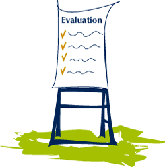 Evaluations:
In addition to the day-to-day
observations in your journal, you will
have the opportunity to evaluate the
class, the instructor, and your
classmates. Two important areas of
evaluation will be the student
presentations. Evaluation criteria for
the presentation are suggested at:
https://people.highline.edu/iglozman/classes/preseval.htm.
Lab evaluations are described here:
https://people.highline.edu/iglozman/classes/labeval.htm.
The effort that goes into your
evaluations is no less important than
the actual presentation, so please take
it seriously. The exercise of evaluating others
(as well as yourself) is a valuable learning tool
because it forces the evaluator to take
responsibility and focus on important
issues.
Evaluations:
In addition to the day-to-day
observations in your journal, you will
have the opportunity to evaluate the
class, the instructor, and your
classmates. Two important areas of
evaluation will be the student
presentations. Evaluation criteria for
the presentation are suggested at:
https://people.highline.edu/iglozman/classes/preseval.htm.
Lab evaluations are described here:
https://people.highline.edu/iglozman/classes/labeval.htm.
The effort that goes into your
evaluations is no less important than
the actual presentation, so please take
it seriously. The exercise of evaluating others
(as well as yourself) is a valuable learning tool
because it forces the evaluator to take
responsibility and focus on important
issues.
 Evaluations
will be graded mostly on the effort and
thought that goes into them.
Constructive criticism generally
receives the highest marks. An effective
critique is one which takes a position
and offers a justification. An
ineffective critique is one which offers
an empty statement like "Everybody was
great," with no further justification.
Remember, everyone can always do better,
so try to come up with some tips and
observations. Evaluations should be
submitted in a timely manner in
Canvas. Toward the end of the
course, you will also have the
opportunity to evaluate the course and
estimate the grade that you think you
deserve based on the criteria in this
syllabus. Here's the list of important
opportunities to make observations and
offer analysis:
Evaluations
will be graded mostly on the effort and
thought that goes into them.
Constructive criticism generally
receives the highest marks. An effective
critique is one which takes a position
and offers a justification. An
ineffective critique is one which offers
an empty statement like "Everybody was
great," with no further justification.
Remember, everyone can always do better,
so try to come up with some tips and
observations. Evaluations should be
submitted in a timely manner in
Canvas. Toward the end of the
course, you will also have the
opportunity to evaluate the course and
estimate the grade that you think you
deserve based on the criteria in this
syllabus. Here's the list of important
opportunities to make observations and
offer analysis:
- Journals
- Lab evaluations
- Presentation evaluations
- Science articles
- Class evaluation
- Grade evaluation (you can negotiate your grade here)
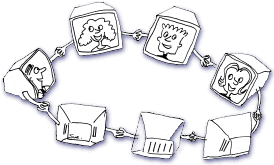
Forum: One good way to
interact with your classmates without the headache of organizing meetings
is to exchange ideas in the “virtual
forum” or discussion web set up specifically for your class in
Canvas. I encourage you to use
the forum to solve homework problems
together, ask questions, make
suggestions, or simply air some
thoughts. In addition, important
announcements will appear in the forum.
Remember that you are all in this
adventure together, so please do as much
as you can to contribute. Most of you
will find visiting the forum a pleasant
adventure, a way to hang out with
familiar characters. For some, the forum
will turn out to be an addiction--but
fortunately one of the healthy ones.
Note: To get full credit for forum
participation, you need to demonstrate
not only a consistent effort throughout
the quarter but also some depth in at
least a few of your posts. As with the
science articles (see below), it is not
sufficient to unload during the last
couple of weeks.
-
The forum extends the classroom.
-
Look for important
announcements in the forum.
-
Make some connections in
the forum.
 Science articles:
Read an article on a
science-related topic and submit (post)
a short blurb in the
Articles forum. This blurb should be no longer
than a couple of sentences, a quick
summary of the big ideas--just long
enough to whet the reader's appetite.
Include a couple of
challenging questions (and answers)
related to the article, as well as a
reference (link).
Science sources can be found
all over the web, as suggested by (but
not limited to) to this list:
Science articles:
Read an article on a
science-related topic and submit (post)
a short blurb in the
Articles forum. This blurb should be no longer
than a couple of sentences, a quick
summary of the big ideas--just long
enough to whet the reader's appetite.
Include a couple of
challenging questions (and answers)
related to the article, as well as a
reference (link).
Science sources can be found
all over the web, as suggested by (but
not limited to) to this list:
http://people.highline.edu/iglozman/bibliography.htm
Here is a couple
of
examples::
- Article#1: How fast do planets
form?
A new study suggests that planets
may form much faster than once
believed. Using powerful computer
models, it has been estimated that
planets may form in just a few hundred
years, as opposed to millions.Read
about it here:
http://www.space.com/scienceastronomy/planets_quickly_021129.html
Q: How are planets generally
believed to be formed? A: After the formation of the core,
the young planet begins collects
material, 'snowballing' into a larger
planet. It is a slow process, and can
take millions of years.
Q: What's wrong with that? Sounds
good to me! A: Well, beyond Saturn there
doesn't seem like there would be
enough material to form Neptune and
Uranus. Also, it is believed that the
only likely way Jupiter could have
come into being is through a more
rapid formation (this was determined
from the composition of Jupiter's
atmosphere).
Older article here:
http://www.space.com/scienceastronomy/solarsystem/jupiter_elements_991117.html
- Article#1: Bad news for sharks
Due to deep misconception and sheer
stupidity the shark population has
been declining based on the belief
that shark cartilage can cure cancer.
Q: How is it supposed to
work? A: It isn't, people
believe stupid things
Q: Has there been any proof?
A: No, as a result cancer
patients have not been accepting more
reliable forms of treatment.
Q: Is there any hope? A: For us or
the sharks? There may be a possibility
to refine a compound for anti-cancer
purposes from shark, but that has yet
to be done. As for the sharks...they
can only hope we get smarter (for our
sake, as well as theirs).
To learn more about the stupidity
of some people..
http://www.medicalnewstoday.com/medicalnews.php?newsid=17189
- Article#1: Robots with a sense of
touch?
Researchers in Tokyo have developed an
array of pressure sensing transistors
which may be implemented in giving
robots a sense of touch. The “pressure
sensing” comes from a change in
resistance within the array when
pressure is applied to the rubber
sheet in which they are contained.
Q: What is beneficial about a robot
with pressure sensing abilities? A:
Pressure sensing would allow robots to
handle more sensitive/fragile objects,
and may be one step closer to a
human-like robot.
Q: Are there any other possible
applications for transistor arrays
such as this? A: There are many ways
pressure sensing arrays like this can
be implemented. Some examples are
monitoring hospital patients in their
beds with pressure sensing sheets, or
possibly a new variety of home
security systems.
Ref:
http://www.trnmag.com/Stories/2004/092204/Flexible_sensors_make_robot_skin%20_092204.html

- Article#1: "Who
mourns for Hubble?"
Just two days after Bush
announces his plans to send humans
to the Moon and Mars, NASA announces
that the Hubble Space Telescope (HST)
will no longer be serviced. This
means that HST has been effectively
sentenced to death.
Q: How often does HST have to be
serviced: A: That varies with
circumstances (plans, failures,
etc.), but every 2-4 years is
typical. HST was last serviced in
March of 2002 to have one of its
cameras replaced. A couple of new
cameras were to be installed in
2006, but those plans have now been
scrapped.
Q: How long can HST remain in
orbit without being serviced? A:
Failure of one of its critical
components is a random event which
could occur at any time between now
and a few years from now. The most
critical components include
gyroscopes (for maintaining
direction) and batteries (from 1990,
were to be replaced in 2006). Of the
six gyroscopes onboard, two have
already failed and a third is
showing signs of trouble.
Q: Why abandon HST, which has
been so hugely successful? A:
Maintaining HST is quite expensive
and would have involved the
development of new technology in the
wake of the recent Columbia Shuttle
disaster. Its abandonment represents
one of many sacrifices science would
have to make to help pay for the
president's new initiatives. Also,
NASA is committed to building the
James Webb Space Telescope,
considered Hubble's successor and
currently scheduled for launch in
2011.
Q: What can be done to extend
HST’s life without servicing it? A:
As far as preserving battery life as
long as possible, HST could run only
one science instrument at a time,
instead of all of them at once (as
it has in the past).
Q: Wouldn’t HST threaten people
and property on the ground when its
orbit decays and it crashes to
Earth? A: To prevent serious injury
on the ground, NASA plans to develop
a robot which would fly to the
telescope, attach a retrorocket, and
steer the spacecraft to a harmless
reentry over an unpopulated area.
ref:
http://skyandtelescope.com/news/article_1156_1.asp
These articles are intended to encourage
you to practice your written
communication skills, especially as they
relate to scientific material. Your
effort on the articles will become part
of your overall grade on the
presentation. While some students find
it difficult to add yet another task to
their already busy schedules, the
potential benefits suggest that it might
be a good investment. These include:
-
 opportunity to improve one's
scientific literacy
opportunity to improve one's
scientific literacy
- opportunity to get excited about
science and science education
- opportunity to improve one's
ability to present information in a
concise and exciting way (something
that most people find difficult, and
this is particularly evident during
their oral presentations)
- practice in identifying the BIG
PICTURE
- practice with time management
- excuse to interact with peers
Be prepared to respond to questions
that might arise in connection to these
articles. This is all very informal, so
try not to be too stressed about it, but
do put some effort into it. As with
forum participation (see above), consistency is very
important, so try not to unload during
the last week or two. You need to do about 1
article per week (in the forum). More is
better, less is worse. You also need to respond to
at least two articles per week in the
forum. Your response not only keeps
you alert to others' posts, but also
encourages others to keep posting.
(An indifferent audience is not very
motivating.) Keep track of your
activities with regard to articles
and comment on them in the journals.
Keys
to success
 Attitude
and perspective: Although
physics tends to be challenging for
most students, the real difficulty
is not the subject matter but rather
the attitude with which it is
approached. The best approach is to
work hard and apply oneself. In
addition, maintain a positive
attitude and a
love of learning at all times.
Try not whine about how difficult
the material is; instead, try to
have fun and be grateful for your
educational opportunities. When you
start to feel a little stressed from
school, try to think about the
starving orphan in some third-world,
poverty-stricken village who would
love to trade places with you. It's
all a question of
perspective, so try to maintain
a healthy one.
Attitude
and perspective: Although
physics tends to be challenging for
most students, the real difficulty
is not the subject matter but rather
the attitude with which it is
approached. The best approach is to
work hard and apply oneself. In
addition, maintain a positive
attitude and a
love of learning at all times.
Try not whine about how difficult
the material is; instead, try to
have fun and be grateful for your
educational opportunities. When you
start to feel a little stressed from
school, try to think about the
starving orphan in some third-world,
poverty-stricken village who would
love to trade places with you. It's
all a question of
perspective, so try to maintain
a healthy one.
- Maintain a positive attitude.
- Appreciate educational
opportunities.
- Learn because it's fun, not
because you have to.
- "A pessimist sees the
difficulty in every opportunity;
an optimist sees the opportunity
in every difficulty."-- More
Winston Churchill
 Deadlines and due
dates: Deadlines and due dates are an integral part of the world we live in.
We all have to deal with them and they help us stay on track. In that regard,
this class is no different: All assignments come with a due date. The due date
should not be interpreted as the day to work feverishly on an assignment;
rather, you should be working on assignments with consistency (not in spikes) as
soon as they are available, keeping the due dates in mind as aids in helping you
manage your time and tasks efficiently. Those that have trouble staying on top
of due dates might consider mentally moving the due date up to a somewhat
earlier time. Keep in mind that the ability to keep up with the due dates is part of each
assignment. If you miss an assignment (for any reason), you should explain your
circumstances in your journal and/or in person to your instructor.
Deadlines and due
dates: Deadlines and due dates are an integral part of the world we live in.
We all have to deal with them and they help us stay on track. In that regard,
this class is no different: All assignments come with a due date. The due date
should not be interpreted as the day to work feverishly on an assignment;
rather, you should be working on assignments with consistency (not in spikes) as
soon as they are available, keeping the due dates in mind as aids in helping you
manage your time and tasks efficiently. Those that have trouble staying on top
of due dates might consider mentally moving the due date up to a somewhat
earlier time. Keep in mind that the ability to keep up with the due dates is part of each
assignment. If you miss an assignment (for any reason), you should explain your
circumstances in your journal and/or in person to your instructor.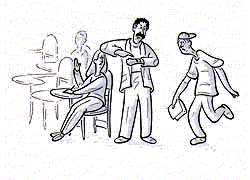
- Study with consistency, not in
spikes.
- Keep up with the due dates.
- Avoid the temptation of asking for extensions.
***Preparing for class: In
this course, students are expected to
come to class prepared, having gone
over at least some of the relevant
material in the textbook. For best
results, the class should be
considered a supplement rather than a
substitute for reading and independent
study. The instructor cannot make you
learn; the instructor is only the tour
guide. So don't be afraid to learn
things on your own, outside of class.
You are expected to do so--during this
class and during the rest of your
lives. Throughout the quarter,
students will be given frequent
opportunities in class to demonstrate
their level of preparedness by making
a sincere attempt to answer questions
posed by other students or by the
instructor. While this may seem
intimidating at first, it is really an
effective way to motivate students to
be actively engaged in a classroom
discussion. (The alternative, and
usually less appealing, option is the
dreaded pop quiz. So stay on your toes
and don't make me resort to it.:))
- READ the book.
- Come to class on time and prepared.
- Do not rely on the instructor to
learn the material (instructor is
only the tour guide).
Objectives
Academic
maturity: Academic maturity is an umbrella
term used to describe those
characteristics which allow students to
reach their academic potential and achieve
growth in an academic environment and
ultimately in the field of their choice.
Characteristics generally associated with
academic maturity include:
- Self-motivated and independent
learner.
- Prefers constructive criticism
to whining.
- Enthusiasm for learning.
- Perseverance.
- Ability to cope with real-world stressors.
- Ability to meet
deadlines with minimal
procrastination.
In their book
Making Sense of College Grades (Jossey-Bass,
1986), Ohmer Milton, Howard R. Pollio, and
James A. Eison found that
learning-oriented college students were
more inclined to explore possibilities and
relationships rather than to work only
with known facts; they also were more
attentive to lectures. In contrast,
grade-oriented students who focus on
"making the grade"--for example, who
only read material that will be tested and
view other class reading as an
inconvenient waste of time--performed
less well on exams, had poorer study
habits, and were twice as likely to report
having cheated repeatedly. So try to
approach your educational opportunities in
a mature, knowledge-hungry way. Remember
that only about half of your
grade will be based on exams. The other
half will be based on academic maturity
(in its various forms).
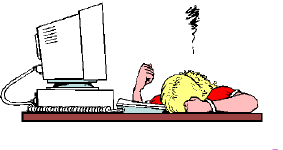 Independent learning: In this
class, students are expected to
develop the ability to read the book
and to be independent of the
instructor (as much as possible) in
learning the material. The
instructor should be viewed more as
a tour guide and facilitator than a transferrer of knowledge. For
best results, you should try to
familiarize yourself with the
concepts before seeing them in
class. The due dates for homework
assignments are timed to motivate
you to stay on top of the material
and discourage you from
procrastination.
Independent learning: In this
class, students are expected to
develop the ability to read the book
and to be independent of the
instructor (as much as possible) in
learning the material. The
instructor should be viewed more as
a tour guide and facilitator than a transferrer of knowledge. For
best results, you should try to
familiarize yourself with the
concepts before seeing them in
class. The due dates for homework
assignments are timed to motivate
you to stay on top of the material
and discourage you from
procrastination.

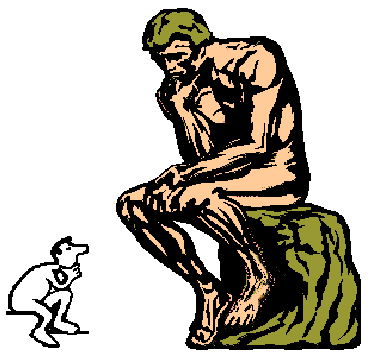 Critical
thinking: "Critical thinking"
and "thinking outside the box" are
catch phrases which are receiving
increasingly more attention in both
education and in the industrial
world. Traditionally, education of
the masses has emphasized the rote
memorization of facts rather than
depth of understanding. In today's
fast-paced world, however, as
information proliferates and becomes
obsolete more rapidly, the
traditional assembly-line philosophy
of learning can no longer be
considered adequate. Indeed,
information becomes less important
than the ability to access
information, to identify and define
issues or problems, to generate
hypotheses, to construct arguments,
to make inferences, and to evaluate
results. All these new demands
require that students actively
engage in learning rather than
passively "receive" knowledge. So do
your best to become
active learners.
Critical
thinking: "Critical thinking"
and "thinking outside the box" are
catch phrases which are receiving
increasingly more attention in both
education and in the industrial
world. Traditionally, education of
the masses has emphasized the rote
memorization of facts rather than
depth of understanding. In today's
fast-paced world, however, as
information proliferates and becomes
obsolete more rapidly, the
traditional assembly-line philosophy
of learning can no longer be
considered adequate. Indeed,
information becomes less important
than the ability to access
information, to identify and define
issues or problems, to generate
hypotheses, to construct arguments,
to make inferences, and to evaluate
results. All these new demands
require that students actively
engage in learning rather than
passively "receive" knowledge. So do
your best to become
active learners.
- Think outside the box.
- Be a creative thinker.
- Recognize the difference
between critical thinking and
stupid pet tricks.
 Understanding vs memorization:
Physics deals with quantitative as well
as qualitative concepts. The
quantitative aspects of physics
generally involve the manipulation and
application of formulas. While the
initial impression may be that there are
many, many complicated-looking formulas,
the reality is that all these formulas
are based on only a few fundamental and
relatively simple relations. You will
find that if you invest some time into
understanding these simple relations and
the qualitative concepts behind them,
you will not only gain a deeper and
longer-lasting understanding of physics,
but you will also save yourself from the
daunting task of having to memorize
these formulas and from the recurring
nightmare of misapplying them. For your
continued edification, the "internalize
but do not memorize" mantra will be
chanted repeatedly throughout the
course.
Understanding vs memorization:
Physics deals with quantitative as well
as qualitative concepts. The
quantitative aspects of physics
generally involve the manipulation and
application of formulas. While the
initial impression may be that there are
many, many complicated-looking formulas,
the reality is that all these formulas
are based on only a few fundamental and
relatively simple relations. You will
find that if you invest some time into
understanding these simple relations and
the qualitative concepts behind them,
you will not only gain a deeper and
longer-lasting understanding of physics,
but you will also save yourself from the
daunting task of having to memorize
these formulas and from the recurring
nightmare of misapplying them. For your
continued edification, the "internalize
but do not memorize" mantra will be
chanted repeatedly throughout the
course.
- Internalize but do not
memorize.
- Understand simple relations;
derive more complicated ones.

 ***Computer
literacy: Computers are a
general-purpose tool; they may appeal
to different people in different ways.
One person may like graphics and
animation. Another may like electronic
mail. Another may prefer video games.
Whatever one's particular uses of a
computer, proficiency with a computer
can dramatically increase one's productivity
and potential for success.
Unfortunately, not everyone is
completely comfortable with the use of
computers, and some even suffer from
computer phobia. Fortunately, like all
irrational fears, computer phobia is no
match for a determined, curiosity-driven
mind and gradually dissolves with
practice and perseverance.
***Computer
literacy: Computers are a
general-purpose tool; they may appeal
to different people in different ways.
One person may like graphics and
animation. Another may like electronic
mail. Another may prefer video games.
Whatever one's particular uses of a
computer, proficiency with a computer
can dramatically increase one's productivity
and potential for success.
Unfortunately, not everyone is
completely comfortable with the use of
computers, and some even suffer from
computer phobia. Fortunately, like all
irrational fears, computer phobia is no
match for a determined, curiosity-driven
mind and gradually dissolves with
practice and perseverance.
As with most new things, there is a
learning curve, and feeling some
frustration at times is perfectly
natural. The important thing to realize
is that learning to use computer
technology (in its many incarnations) is
not something that should be considered
a distraction from class work; it IS a
big part of the class. Irrespective of
background, all students in the class
will be expected to master the following
list of computer-related skills:
- Getting and submitting assignments
online
- Using email and a discussion web
to communicate with instructor and
classmates
- Surfing the web for research and
for fun
- Using PowerPoint to create
presentations
Pedagogy
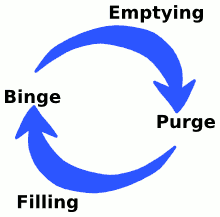 A paradigm shift:
According to William Perry's
Scheme of Intellectual Development,
the typical first-year college
student has a dualistic view of
knowledge, believing that right
answers for everything exist in the
absolute and that the role of the
instructor is to teach them.
Knowledge represents a gradual
accretion of right answers acquired
through effort and obedience to the
instructor. Sadly, traditional
teaching practices, particularly in
introductory courses, tend to
reinforce, rather than challenge,
this unsophisticated view of
learning. Traditional approaches
emphasize the presentation of
information, and define learning as
its absorption. In contrast to this
traditional content-driven paradigm,
an effective student-centered,
learning-oriented classroom involves
a more active approach to learning,
characterized by the following basic
principles:
A paradigm shift:
According to William Perry's
Scheme of Intellectual Development,
the typical first-year college
student has a dualistic view of
knowledge, believing that right
answers for everything exist in the
absolute and that the role of the
instructor is to teach them.
Knowledge represents a gradual
accretion of right answers acquired
through effort and obedience to the
instructor. Sadly, traditional
teaching practices, particularly in
introductory courses, tend to
reinforce, rather than challenge,
this unsophisticated view of
learning. Traditional approaches
emphasize the presentation of
information, and define learning as
its absorption. In contrast to this
traditional content-driven paradigm,
an effective student-centered,
learning-oriented classroom involves
a more active approach to learning,
characterized by the following basic
principles:
- Teaching excellence does
not necessarily equal sound
academic knowledge, extensive
content coverage, and polished
presentation skills.
- Excellence in learning does
not necessarily equal the
flawless recall and summary of
information.
- Rather than the strict
coverage of content, the goal of
instruction centers on the
intellectual development of
students.
- The learner's brain is no
longer considered a vessel to be
filled by the expertise of the
instructor.
- Students learn to think
independently while the
instructor facilitates the
process.
- Students learn to judge the
merits of ideas, information,
and values based on certain
criteria ("knowledge is
context-dependent").
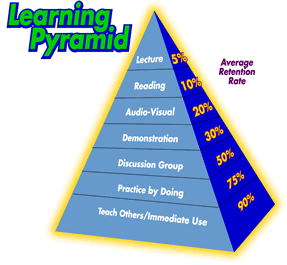
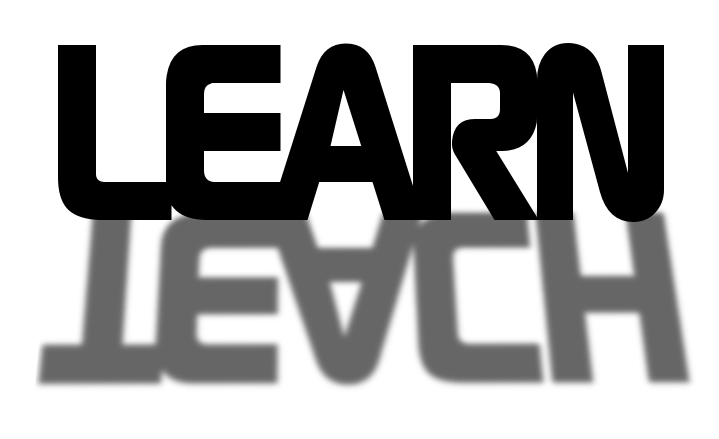 Active
vs passive: ***In the
traditional model of education, the
instructor is expected to have all
the answers, while the student is
expected to listen, take notes, and
then demonstrate how full of
knowledge he/she has become (usually
on a test). In this model, brains
are essentially treated as passive
receptacles to be filled by the
expertise of the instructor. And while most
educational experts today recognize
that this is not an effective mode
of teaching (as this
learning pyramid illustrates), it is still
unfortunately the predominant mode
of education at the undergraduate
levels. Hopefully, we can do a
little better in this class. In
particular, students in this class
will be expected to be active
participants in the learning
community, teaching themselves as
well as others, being proactive
instead of reactive. While this is
not always most comfortable for many
students, it does appear to be the
best way to learn, which is the
objective in this class.
Active
vs passive: ***In the
traditional model of education, the
instructor is expected to have all
the answers, while the student is
expected to listen, take notes, and
then demonstrate how full of
knowledge he/she has become (usually
on a test). In this model, brains
are essentially treated as passive
receptacles to be filled by the
expertise of the instructor. And while most
educational experts today recognize
that this is not an effective mode
of teaching (as this
learning pyramid illustrates), it is still
unfortunately the predominant mode
of education at the undergraduate
levels. Hopefully, we can do a
little better in this class. In
particular, students in this class
will be expected to be active
participants in the learning
community, teaching themselves as
well as others, being proactive
instead of reactive. While this is
not always most comfortable for many
students, it does appear to be the
best way to learn, which is the
objective in this class.
If you want to build a ship,
don't drum up the men to gather
wood, divide the work, and give
orders. Instead, teach them to yearn
for the vast and endless sea.—Antoine de Saint-Exupéry
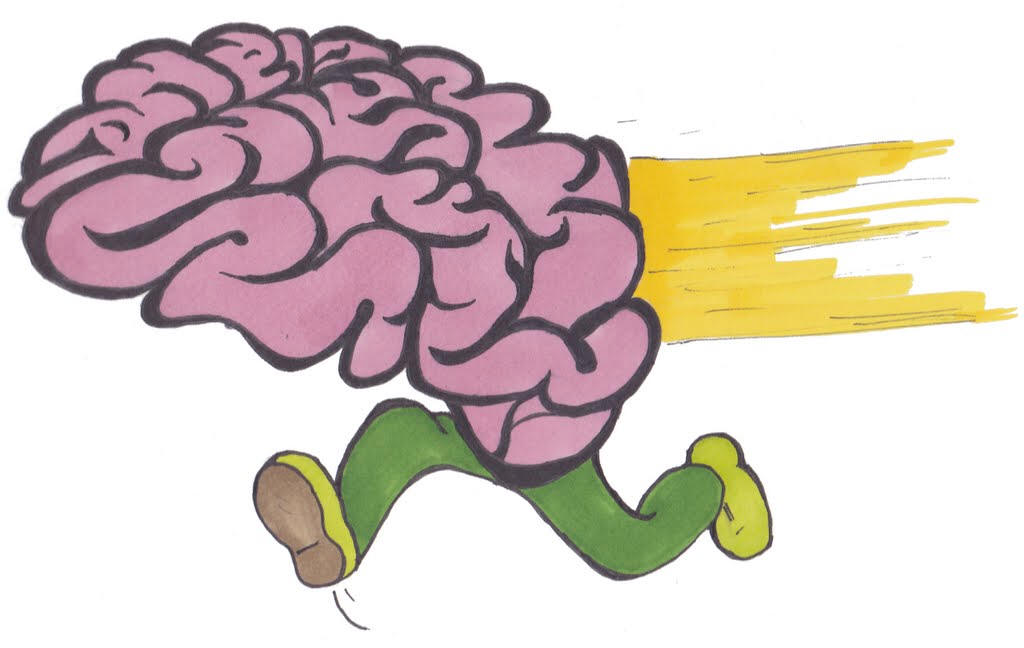
Here's an interesting
pamphlet with some useful tips
for and observations about learning
physics. For example, it points out
that taking good notes in a physics
class is quite different from taking
good notes in a history class. Do
you know the difference? Although
written just after World War II, the
pamphlet shows that the approach to
learning physics has remained
essentially the same.
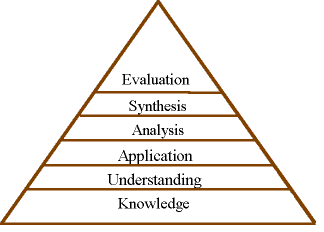 Bloom's
Taxonomy: Much of the philosophy
behind the various class activities
and components is based on
Bloom's Taxonomy of the Cognitive
Domain, a learning theory
based on six levels of intellectual
behaviors: knowledge, comprehension,
application, analysis, synthesis,
and evaluation. These levels
progress from the simplest,
knowledge (the remembering,
either by recognition or recall, of
ideas, materials, and phenomena) to
the most complex, evaluation
(the making of judgments about the
value, for some purpose, of ideas,
works, solutions, methods, material,
etc.).
Bloom's
Taxonomy: Much of the philosophy
behind the various class activities
and components is based on
Bloom's Taxonomy of the Cognitive
Domain, a learning theory
based on six levels of intellectual
behaviors: knowledge, comprehension,
application, analysis, synthesis,
and evaluation. These levels
progress from the simplest,
knowledge (the remembering,
either by recognition or recall, of
ideas, materials, and phenomena) to
the most complex, evaluation
(the making of judgments about the
value, for some purpose, of ideas,
works, solutions, methods, material,
etc.).
- The brain should not
be regarded as a passive
receptacle of knowledge.
- "The purpose of education is
to change the thoughts, feelings
and actions of students." -
Benjamin Bloom (1913 - 1999)
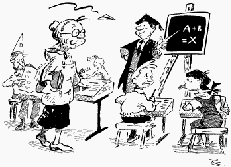 Learning styles: Have
you ever wondered why you loved history
while your friends hated it, felt
inspired by one particular faculty
member while your friends thought she
was boring? Have you ever been
uncomfortable at a party while others
seem to be having a wonderful time? Do
you ever wonder why others miss
deadlines and never seem to have things
organized? All of these are connected to
our personality type and our preferred
way of doing and viewing things. When we
are in a classroom environment that
matches our learning style, everything
feels right. The teacher is stimulating,
the material exciting, the work
enjoyable. But if the environment does
not match our preferred learning style,
we feel out of place, uncomfortable, and
unable to do our best. There are no
right or wrong, good or bad learning
styles, just preferred styles.
Understanding learning styles and
personality preferences provides an
important dimension of self-discovery
and personal growth for students.
Knowing what we have in common with
others, how we differ, and what is
unique about ourselves can be both
empowering and critical to our success
in college and beyond. One of the most
popular rubrics for understanding
personality types is the Myers-Briggs
Type Indicator (MBTI). What's your MBTI?
Find out here:
http://www.gsu.edu/~dschjb/wwwmbti.html.
Learning styles: Have
you ever wondered why you loved history
while your friends hated it, felt
inspired by one particular faculty
member while your friends thought she
was boring? Have you ever been
uncomfortable at a party while others
seem to be having a wonderful time? Do
you ever wonder why others miss
deadlines and never seem to have things
organized? All of these are connected to
our personality type and our preferred
way of doing and viewing things. When we
are in a classroom environment that
matches our learning style, everything
feels right. The teacher is stimulating,
the material exciting, the work
enjoyable. But if the environment does
not match our preferred learning style,
we feel out of place, uncomfortable, and
unable to do our best. There are no
right or wrong, good or bad learning
styles, just preferred styles.
Understanding learning styles and
personality preferences provides an
important dimension of self-discovery
and personal growth for students.
Knowing what we have in common with
others, how we differ, and what is
unique about ourselves can be both
empowering and critical to our success
in college and beyond. One of the most
popular rubrics for understanding
personality types is the Myers-Briggs
Type Indicator (MBTI). What's your MBTI?
Find out here:
http://www.gsu.edu/~dschjb/wwwmbti.html.
Cooperative
learning: Extensive educational
research indicates that when
students
learn together in pairs or in
small groups, the learning is
faster, there is greater retention,
and students feel more positive
about the learning process. The
value of cooperative learning has
resulted in its widespread use
throughout the country, and it has
become a standard part of most
pre-service training. Several
components of this course, including
lab and group presentation, are
designed to give you the opportunity
to develop some of these skills.
When working on group projects, all
group members must participate in
all aspects of the project, not
simply taking turns. While we can
all come up with pretty creative
excuses why it's difficult to meet
as a group outside of class, the
ability to do so is an important
objective of the class (and in the
real world), no less important than
the scores on an exam.

 Participation:
There is an old saying that "It's
better to be thought a fool than to
open your mouth and remove all doubt."
While this attitude is quite pervasive
among students, it usually constitutes
an impediment to learning in the
classroom.
Class participation is very
important not only for your own success but also for that of your
classmates. So try to become active participants in the learning
community, whether it be the actual
classroom or in the discussion board. Form study
groups, participate in classroom discussions, and be prepared to answer
questions when called upon in class. Of course,
feel free to ask questions at any time. While
attendance is not mandatory, except in
labs and during student presentations, excessive absences
can lower you
participation grade and will also leave a bad
impression.
Participation:
There is an old saying that "It's
better to be thought a fool than to
open your mouth and remove all doubt."
While this attitude is quite pervasive
among students, it usually constitutes
an impediment to learning in the
classroom.
Class participation is very
important not only for your own success but also for that of your
classmates. So try to become active participants in the learning
community, whether it be the actual
classroom or in the discussion board. Form study
groups, participate in classroom discussions, and be prepared to answer
questions when called upon in class. Of course,
feel free to ask questions at any time. While
attendance is not mandatory, except in
labs and during student presentations, excessive absences
can lower you
participation grade and will also leave a bad
impression.



 Exams: This is your chance to show off what you
have learned. Much of the material on the exams is taken almost directly
from the homework. So if you do your homework
and stay alert in class, you should have no trouble. The final tends to be
a bit more challenging than the midterms,
particularly for those students who tend
to cram and memorize. On the other hand,
the final can also be your opportunity to make up for any
weaknesses that may have existed up to
that point. Because of the wide spectrum
of preparedness on the part of the
students, the distribution of scores on
the exams can also be quite broad. An
average of 50-60% is not unusual, with
some students significantly above and
some below. If you need special
accommodations, please let me know in advance.
Exams: This is your chance to show off what you
have learned. Much of the material on the exams is taken almost directly
from the homework. So if you do your homework
and stay alert in class, you should have no trouble. The final tends to be
a bit more challenging than the midterms,
particularly for those students who tend
to cram and memorize. On the other hand,
the final can also be your opportunity to make up for any
weaknesses that may have existed up to
that point. Because of the wide spectrum
of preparedness on the part of the
students, the distribution of scores on
the exams can also be quite broad. An
average of 50-60% is not unusual, with
some students significantly above and
some below. If you need special
accommodations, please let me know in advance.

 Webassign
and Canvas:
All assignments in this class are
submitted online either at
Webassign
and Canvas:
All assignments in this class are
submitted online either at




 Evaluations
will be graded mostly on the effort and
thought that goes into them.
Constructive criticism generally
receives the highest marks. An effective
critique is one which takes a position
and offers a justification. An
ineffective critique is one which offers
an empty statement like "Everybody was
great," with no further justification.
Remember, everyone can always do better,
so try to come up with some tips and
observations. Evaluations should be
submitted in a timely manner in
Canvas. Toward the end of the
course, you will also have the
opportunity to evaluate the course and
estimate the grade that you think you
deserve based on the criteria in this
syllabus. Here's the list of important
opportunities to make observations and
offer analysis:
Evaluations
will be graded mostly on the effort and
thought that goes into them.
Constructive criticism generally
receives the highest marks. An effective
critique is one which takes a position
and offers a justification. An
ineffective critique is one which offers
an empty statement like "Everybody was
great," with no further justification.
Remember, everyone can always do better,
so try to come up with some tips and
observations. Evaluations should be
submitted in a timely manner in
Canvas. Toward the end of the
course, you will also have the
opportunity to evaluate the course and
estimate the grade that you think you
deserve based on the criteria in this
syllabus. Here's the list of important
opportunities to make observations and
offer analysis:


 opportunity to improve one's
scientific literacy
opportunity to improve one's
scientific literacy Attitude
and perspective: Although
physics tends to be challenging for
most students, the real difficulty
is not the subject matter but rather
the attitude with which it is
approached. The best approach is to
work hard and apply oneself. In
addition, maintain a positive
attitude and a
Attitude
and perspective: Although
physics tends to be challenging for
most students, the real difficulty
is not the subject matter but rather
the attitude with which it is
approached. The best approach is to
work hard and apply oneself. In
addition, maintain a positive
attitude and a
 Deadlines and due
dates: Deadlines and due dates are an integral part of the world we live in.
We all have to deal with them and they help us stay on track. In that regard,
this class is no different: All assignments come with a due date. The due date
should not be interpreted as the day to work feverishly on an assignment;
rather, you should be working on assignments with consistency (not in spikes) as
soon as they are available, keeping the due dates in mind as aids in helping you
manage your time and tasks efficiently. Those that have trouble staying on top
of due dates might consider mentally moving the due date up to a somewhat
earlier time. Keep in mind that the ability to keep up with the due dates is part of each
assignment. If you miss an assignment (for any reason), you should explain your
circumstances in your journal and/or in person to your instructor.
Deadlines and due
dates: Deadlines and due dates are an integral part of the world we live in.
We all have to deal with them and they help us stay on track. In that regard,
this class is no different: All assignments come with a due date. The due date
should not be interpreted as the day to work feverishly on an assignment;
rather, you should be working on assignments with consistency (not in spikes) as
soon as they are available, keeping the due dates in mind as aids in helping you
manage your time and tasks efficiently. Those that have trouble staying on top
of due dates might consider mentally moving the due date up to a somewhat
earlier time. Keep in mind that the ability to keep up with the due dates is part of each
assignment. If you miss an assignment (for any reason), you should explain your
circumstances in your journal and/or in person to your instructor.
 Independent learning: In this
class, students are expected to
develop the ability to read the book
and to be independent of the
instructor (as much as possible) in
learning the material. The
instructor should be viewed more as
a tour guide and facilitator than a transferrer of knowledge. For
best results, you should try to
familiarize yourself with the
concepts before seeing them in
class. The due dates for homework
assignments are timed to motivate
you to stay on top of the material
and discourage you from
procrastination.
Independent learning: In this
class, students are expected to
develop the ability to read the book
and to be independent of the
instructor (as much as possible) in
learning the material. The
instructor should be viewed more as
a tour guide and facilitator than a transferrer of knowledge. For
best results, you should try to
familiarize yourself with the
concepts before seeing them in
class. The due dates for homework
assignments are timed to motivate
you to stay on top of the material
and discourage you from
procrastination.

 Understanding vs memorization:
Physics deals with quantitative as well
as qualitative concepts. The
quantitative aspects of physics
generally involve the manipulation and
application of formulas. While the
initial impression may be that there are
many, many complicated-looking formulas,
the reality is that all these formulas
are based on only a few fundamental and
relatively simple relations. You will
find that if you invest some time into
understanding these simple relations and
the qualitative concepts behind them,
you will not only gain a deeper and
longer-lasting understanding of physics,
but you will also save yourself from the
daunting task of having to memorize
these formulas and from the recurring
nightmare of misapplying them. For your
continued edification, the "internalize
but do not memorize" mantra will be
chanted repeatedly throughout the
course.
Understanding vs memorization:
Physics deals with quantitative as well
as qualitative concepts. The
quantitative aspects of physics
generally involve the manipulation and
application of formulas. While the
initial impression may be that there are
many, many complicated-looking formulas,
the reality is that all these formulas
are based on only a few fundamental and
relatively simple relations. You will
find that if you invest some time into
understanding these simple relations and
the qualitative concepts behind them,
you will not only gain a deeper and
longer-lasting understanding of physics,
but you will also save yourself from the
daunting task of having to memorize
these formulas and from the recurring
nightmare of misapplying them. For your
continued edification, the "internalize
but do not memorize" mantra will be
chanted repeatedly throughout the
course.

 A paradigm shift:
According to William Perry's
A paradigm shift:
According to William Perry's

 Active
vs passive: ***In the
traditional model of education, the
instructor is expected to have all
the answers, while the student is
expected to listen, take notes, and
then demonstrate how full of
knowledge he/she has become (usually
on a test). In this model, brains
are essentially treated as passive
receptacles to be filled by the
expertise of the instructor. And while most
educational experts today recognize
that this is not an effective mode
of teaching (as this
Active
vs passive: ***In the
traditional model of education, the
instructor is expected to have all
the answers, while the student is
expected to listen, take notes, and
then demonstrate how full of
knowledge he/she has become (usually
on a test). In this model, brains
are essentially treated as passive
receptacles to be filled by the
expertise of the instructor. And while most
educational experts today recognize
that this is not an effective mode
of teaching (as this

 Bloom's
Taxonomy: Much of the philosophy
behind the various class activities
and components is based on
Bloom's
Taxonomy: Much of the philosophy
behind the various class activities
and components is based on
 Learning styles: Have
you ever wondered why you loved history
while your friends hated it, felt
inspired by one particular faculty
member while your friends thought she
was boring? Have you ever been
uncomfortable at a party while others
seem to be having a wonderful time? Do
you ever wonder why others miss
deadlines and never seem to have things
organized? All of these are connected to
our personality type and our preferred
way of doing and viewing things. When we
are in a classroom environment that
matches our learning style, everything
feels right. The teacher is stimulating,
the material exciting, the work
enjoyable. But if the environment does
not match our preferred learning style,
we feel out of place, uncomfortable, and
unable to do our best. There are no
right or wrong, good or bad learning
styles, just preferred styles.
Understanding learning styles and
personality preferences provides an
important dimension of self-discovery
and personal growth for students.
Knowing what we have in common with
others, how we differ, and what is
unique about ourselves can be both
empowering and critical to our success
in college and beyond. One of the most
popular rubrics for understanding
personality types is the Myers-Briggs
Type Indicator (MBTI). What's your MBTI?
Find out here:
Learning styles: Have
you ever wondered why you loved history
while your friends hated it, felt
inspired by one particular faculty
member while your friends thought she
was boring? Have you ever been
uncomfortable at a party while others
seem to be having a wonderful time? Do
you ever wonder why others miss
deadlines and never seem to have things
organized? All of these are connected to
our personality type and our preferred
way of doing and viewing things. When we
are in a classroom environment that
matches our learning style, everything
feels right. The teacher is stimulating,
the material exciting, the work
enjoyable. But if the environment does
not match our preferred learning style,
we feel out of place, uncomfortable, and
unable to do our best. There are no
right or wrong, good or bad learning
styles, just preferred styles.
Understanding learning styles and
personality preferences provides an
important dimension of self-discovery
and personal growth for students.
Knowing what we have in common with
others, how we differ, and what is
unique about ourselves can be both
empowering and critical to our success
in college and beyond. One of the most
popular rubrics for understanding
personality types is the Myers-Briggs
Type Indicator (MBTI). What's your MBTI?
Find out here:
